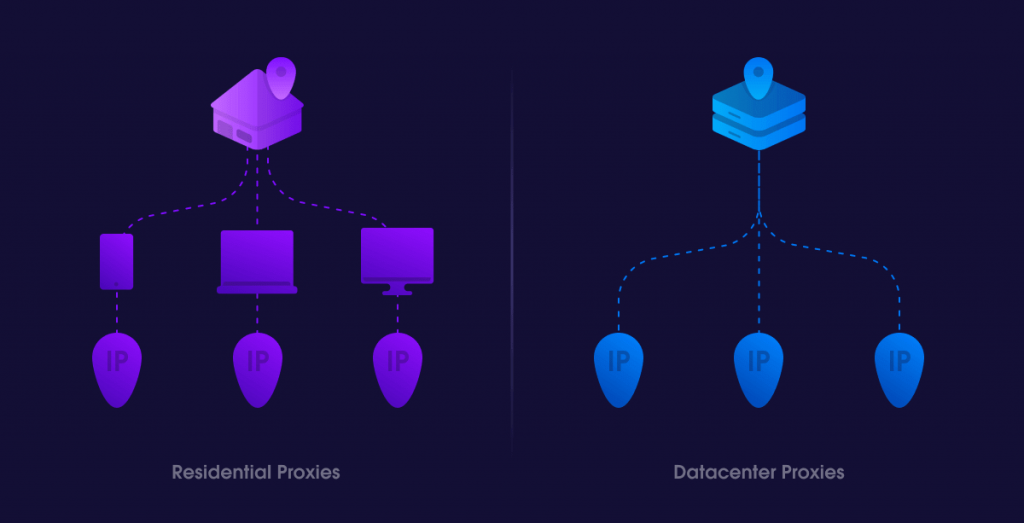How frustrating is it that we can’t play a game because we don’t live in a specific zip code, state, or country? Why should that matter when all we want to do is enjoy the game? Or, what if you unknowingly broke a game’s terms and conditions and have been permanently blocked from playing ever again? This is where a proxy comes in, both data centre proxies and residential proxies.
Hiding your IP with a proxy will protect valuable private information, such as your location, which will allow you to access all the games you desire.
Everything you see on the Internet is through requests you make through your computer to a site that has the information you need. Your computer IP identifies you as the person who has requested the information and to whom the website should send the information.
Before answering what is the best proxy for gaming, let us first cover what a proxy actually is and two types of proxies – datacenter proxies and residential proxies.
What are proxies?
A proxy server (a proxy for short) is a service that carries out an action on behalf of a client’s computer. These are often used by VPNs that help with unlocking geo-restricted content on platforms like Netflix.
Your IP tells gaming websites where you are trying to play the game. When geolocation-based restrictions are placed, a person’s IP is used to determine if they should be given access to that game.
When using a proxy, your original IP is hidden, which allows you to enjoy two huge benefits:
- your actual location is hidden
- your private information is kept safe from hackers who are constantly scouring the Internet for unprotected requests over the Internet.
So, that begs the question, what is the best proxy for gaming?
First, let’s look at data centre proxies and residential proxies.

What are data centre proxies?
As the name suggests, a datacentre proxy is a proxy that originates from a datacentre. When you make a request, it first goes to the data centre, where an IP is assigned to the request before it gets sent to the website. When the website responds, that response is sent back to the data centre where the IP came from, which is then sent to you.
You may be wondering, what are the pros and cons of data centre proxies?
Here are the pros:
- Maintain anonymity: Since a data centre proxy isn’t connected to an actual location, you get to enjoy the anonymity that comes with it. This allows you to prevent your online activities from being tracked.
- Enjoy high speeds: Datacentre proxies are much faster than residential proxies. This prevents the lag that you experience when using residential proxies.
- Affordable pricing: Datacentre proxies are cheaper, thus making it more affordable to buy in bulk, which is something you have to do to get around banned IPs. You also won’t have to pay for extra bandwidth.
Here are the cons:
- Gets banned faster: Sites can quickly identify IPs that come from data centre proxies. Therefore, data centre proxies get banned much faster than residential proxies.
- Have to keep buying more: Although datacentre proxies are affordable to buy in bulk, several websites don’t just block the IP that made the request, but also the sub-net the IP is a part of. This may render several IPs useless even though you have already bought them, which will require you to buy even more.
Now that you understand what data centre proxies are, let’s look at residential proxies.

What are residential proxies?
As the name implies, residential proxies have IPs that are associated with an actual residential address. This is the same as what you get with your ISP (Internet Service Provider). A website cannot differentiate between a normal ISP IP and a residential proxy IP because they are the exact same.
A residential proxy provider allows you to rotate between several real IPs, which doesn’t raise red flags on any system due to the legitimacy of the IPs. So, what are the pros and cons of residential proxies?
Here are the pros:
- Less likely to get banned: Due to residential proxies providing you with real IPs, the risk of getting banned drops drastically. You are able to do almost anything without having the same worries as when using Datacentre proxies.
- Geolocation specific information: Since residential proxy IPs are from different locations, you are able to circumvent location-based restrictions and get access to website results that are specific to those areas.
Here are the cons:
- Higher price: Due to the authenticity and reliability of residential proxies, you can expect to pay a higher premium when compared to datacentre proxies.
- Speed: Residential proxies are not as fast as datacentre proxies. You can expect to face issues with lag while online.
- Ethical issues: Since residential proxies provide real IPs, the people to whom those IPs belong to must first give permission for the residential proxy provider to use them. Unfortunately, this isn’t always the case.
Now that you know what each of the two proxies is and their pros and cons, let us compare the two and see which is the best proxy for gamin.
What is the best proxy for gaming?
While both residential proxies and datacentre proxies have their use cases, it is quite clear which one would be the preferred choice for gamers – datacentre proxies.
Network latency is a huge contributing factor to a gamer’s playing experience. Therefore, gamers can’t afford to deal with lag while completely immersed in the gaming experience. Datacentre proxies provide a much faster and smoother connection than residential IPs and are the best choice when it comes to the world of gaming.

Choosing the right residential proxies for gaming
In the intricate realm of online gaming, the pursuit of an edge often leads players down technical paths. While data centre proxies have traditionally been the go-to for high-speed connections, the evolving gaming landscape now calls for something more refined: residential proxies.
Live Proxies emerges as a frontrunner in this evolution, having mastered the art of crafting residential proxies tailored for the gaming enthusiast. Their offerings not only provide a genuine ISP origin, ensuring reduced risk of IP bans, but they also guarantee consistent speeds. This unique blend promises gamers unrestricted access to global servers and a seamless experience.
For those dedicated to achieving gaming excellence, selecting the right residential proxy is crucial. The promise of stability, speed, and stealth makes residential proxies an attractive proposition. With providers like Live Proxies at the helm, gamers can confidently traverse the digital domain, knowing they have the best tools at their disposal.
Conclusion
To put it simply, both residential proxies and datacentre proxies have their advantages and disadvantages depending on the scenario, but datacentre proxies are the best choice for gaming.
While residential proxies provide real IPs that will allow you free reign of the Internet without having to fear getting banned, data centre proxies are much faster, which is an essential trait for gaming.
Although we do recommend using paid proxies, we have also provided you with three of the best free proxy servers for you to try. Once you are comfortable with using a proxy, we highly recommend switching over to a paid plan, as that is when you experience the true benefits of using proxies, including data security.
Say goodbye to those silly restrictions that prevent you from doing what you truly love doing – gaming.
For even more opinion pieces like this, click right HERE.